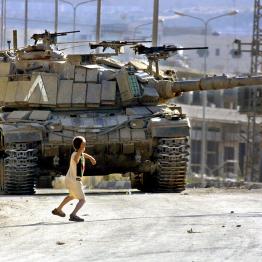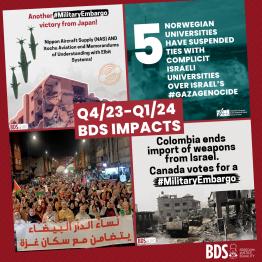Has the time come for a military embargo on the State of Israel?
“[The government] must also halt Britain’s arms exports to Israel,” wrote Liberal Democrat leader and now Deputy Prime Minister Nick Clegg on January 7th 2009, as the world watched Israeli shells destroying a UN school in Gaza. The title of Clegg’s article was unambiguous; “We must stop arming Israel”.
On Friday, the Palestinian Boycott, Divestment and Sanctions National Committee [BNC], a broad coalition encompassing all political factions, and a wealth of trade unions, NGOs and civil organisations, released a call for an immediate and comprehensive military embargo of Israel. It is time for us to heed that call.
“A comprehensive military embargo on Israel is long overdue,” reads the statement. “It forms a crucial step towards ending Israel’s unlawful and criminal use of force against the Palestinian people and other peoples and states in the region, and it constitutes an effective, non-violent measure to pressure Israel to comply with its obligations under international law.”
The call was made on the anniversary of a 2004 International Court of Justice ruling on the legality of the Wall that Israel has constructed, which snakes through the West Bank, separating Palestinian communities from their land. By a vote of 14 judges to 1, the court concluded that “Israel is under an obligation to terminate its breaches of international law; it is under an obligation to cease forthwith the works of construction of the wall being built… including in and around East Jerusalem, to dismantle forthwith the structure therein situated.”
In 2009, I spent six months living in Bil’in, a Palestinian village in the West Bank situated right on the route of the Wall, which had stolen over half of the people’s land. Every Friday, we would demonstrate at the Wall, and demand to return to our land. Despite the ICJ ruling, and an Israeli High Court decision for the route of the Wall to be changed, we were met with Israeli soldiers shooting at us with tear gas, sound grenades and live ammunition, every week. Dozens of people were arrested at the demonstrations, and in nightly house raids, and many were injured in attacks. A brother and sister, Bassem and Jawaher Abu Rahme, both died; Bassem in April 2009, and Jawaher on the first day of 2011. The army would often occupy the entire village, in the day or during the night, in an attempt to dissuade people from demonstrating. Their attempts always failed.
The continued resistance of the people of Bil’in, and a growing international pressure, proved too much for the Israeli army to deal with. The occupation of this village was not worth it. On July 1st, for the first time in over six years, the people of the village did not demonstrate at the Wall. The Wall had been removed. But we cannot celebrate for too long. The Wall, that symbol of Israeli apartheid, remains in the West Bank. As do the checkpoints, and the illegal Israeli colonies sometimes referred to as “settlements”. The people of Gaza remained besieged, and as we attempt to legitimise our arming of rebels in Libya, European citizens taking humanitarian aid to the Gaza Strip are arrested and deported.
Stories like Bil’in continue to inspire us, and it is clear that the Palestinian people will be the ultimate catalyst of the liberation of Palestinian land. But the only question for us is, how can we support them in their struggle? At the very least, we must cut off the supply line to the state that oppresses them. We must refuse to be complicit in the occupation of Palestine, a land that our own military once occupied, and we must desist in arming a rogue state. That is why we must join those such as Archbishop Desmond Tutu, Mairead Maguire and Naomi Klein in supporting this call for a military embargo of Israel. It is the least we can do.




